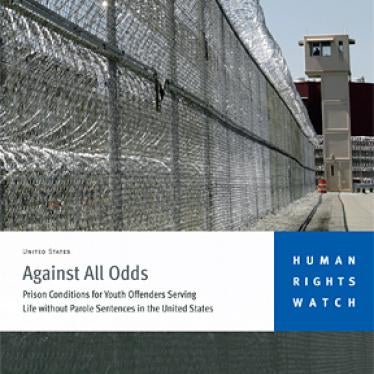(Washington, DC) – Colorado’s General Assembly passed a bill on March 5, 2012 that will help keep children accused of crimes out of adult jails when they are awaiting trial, Human Rights Watch and the American Civil Liberties Union said today. House Bill (HB) 12-1139 passed both houses of Colorado’s General Assembly unopposed.
If enacted into law, HB 12-1139 will help to protect the human rights of the state’s children accused of crimes, Human Rights Watch and the American Civil Liberties Union said. Youth in adult jails and prisons are extremely vulnerable to physical and sexual abuse and have a developmental need for protection, education, and other services to fully mature into adulthood. HB 12-1139 would require authorities to hold youth under age 18 who are subject to pre-trial detention for criminal offenses in facilities designed to hold juveniles, unless a judge decides otherwise in a hearing. Colorado currently houses such youth in jails designed to house adults, often in prolonged solitary confinement.
“HB 12-1139 recognizes that youth merit special protection while they are in the custody of the state,” said Ian Kysel, Aryeh Neier fellow at Human Rights Watch and the American Civil Liberties Union. “No matter their crimes, children should not be thrown into adult jails while awaiting trial.”
Colorado officials recently reported that between July 2010 and June 2011, at least 42 youth under age 18 were held in adult jails, for an average of 117 days. One was reportedly held for more than 220 days. Only 16 youth received the state minimum of four hours of schooling each week.
The bill had broad support from state sheriffs, prosecutors, defense attorneys, mental health practitioners, educators, parents, crime victims, activists, and youth.
The Colorado bill follows a trend of state legislative reforms preferring juvenile custody for youth charged as adults – including in Pennsylvania, Texas, and Virginia. In 2010, the Virginia General Assembly passed a bill (SB 259) that creates a presumption that youth being tried as adults should be held in juvenile facilities before their trial. Under that law, a youth could be transferred to an adult jail if found by a judge to be a threat to security or the safety of staff or other juveniles.
The United States is a signatory to the Convention on the Rights of the Child, which provides that all children under 18 deprived of their liberty should be separated from adults. The US Department of Justice reports that on any given day more than 7,500 youth are held in adult jails nationwide.
“Choosing to hold youth in facilities actually designed for them is a step in the right direction,” Kysel said. “The next step is to further ensure that children accused of wrongdoing are treated like children – who can grow, change, and be rehabilitated – when charged, tried, and sentenced.”







